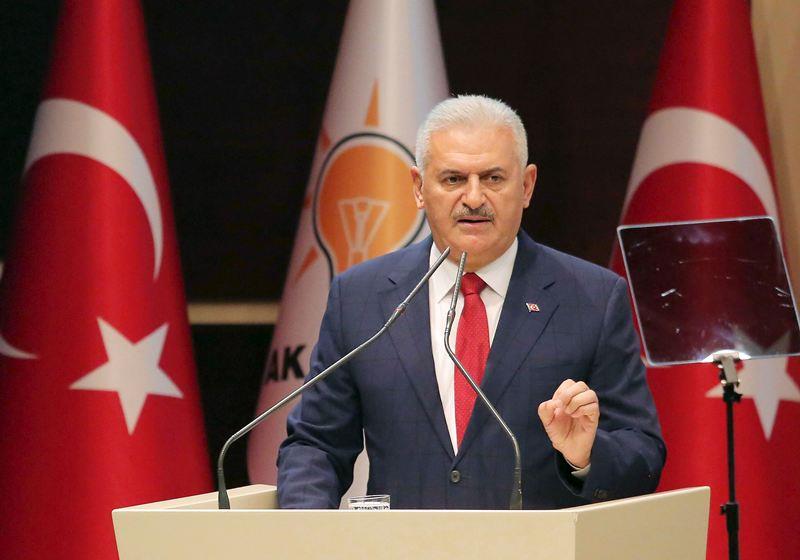
Are Egypt, Syria next in Turkey rapprochement drive?
Ankara: Turkey has in the last month manoeuvered to end damaging foreign policy disputes with Israel and Russia, but Egypt and Syria will be tougher nuts for Ankara to crack in its drive for regional rapprochement.
Turkey has had downgraded relations with Egypt since the ousting of pro-Ankara Islamist president Mohamed Morsi by the Egyptian army in 2013.
And in neighbouring Syria, Turkey has made the exit of President Bashar al-Assad a precondition for ending the more than five-year civil war that has seen some 2.7 million refugees flee to Turkey.
But the appointment of Binali Yildirim -- a close ally of President Recep Tayyip Erdogan -- as prime minister in May signified a more conciliatory approach to foreign policy after the aggressive stance of his predecessor Ahmet Davutoglu.
"We will keep on increasing our friendships by observing the interests of our region and our country," Yildirim told members of his ruling Justice and Development Party (AKP) party this week.
- 'Zero problems' -
Turkey last month agreed a normalisation deal with Israel, following half a decade of downgraded ties due to the deadly storming of a Turkish aid ship bound for Gaza in May 2010.
Ankara ended the crisis with Russia after Erdogan sent a letter to his Russian counterpart Vladimir Putin, expressing regret over the downing of one of Moscow's warplanes in November.
In its latest diplomatic overtures, Turkey has gone back to its previous "zero problems with neighbours" foreign policy that defined the early years of Erdogan's time as premier.
The approach rapidly deteriorated into what critics derided as a policy of "multiple problems with everyone" as Turkey had its hopes dashed of finding friendly regimes in place after the so-called Arab Spring.
"Our default approach is to maintain good relations with everyone unless conflict is inevitable," a Turkish official told AFP on condition of anonymity.
- 'Normal with Syria?' -
After the beginning of the Syrian uprising in 2011, Turkey opened dialogue with Damascus, but Erdogan later became a fierce opponent of Assad, a leader who he had once courted as a friend.
In an headline-grabbing comment on Wednesday, Yildirim said: "We have normalised ties with Israel and Russia. But I am sure that we will return to normal with Syria too."
There was no indication that this signalled a change in policy on Assad, which would represent a complete U-turn of the Turkish policy throughout the civil war that has been to back rebels. Officials say there is a distinction between Syria as a country and Assad.
But there have been sporadic reports in recent weeks of a possible softening in Ankara's position, although Turkey denied press speculation Algeria was mediating contact.
Aaron Stein, resident senior fellow at the Atlantic Council's Rafik Hariri Center for the Middle East, said: "Turkey's softening on Assad" began last summer after Erdogan announced Assad could remain as president for up to six months while a political transition was finalised.
"This policy... differed from Turkey's previous insistence that Assad leave at the beginning of the six-month timeframe," he said.
Previously, the Turkish government under Davutoglu had insisted that Assad's days were numbered.
The main Istanbul-based Syrian opposition coalition says it has been assured by Ankara it still has Turkey's full support.
"There is no change or shift in their policy towards the Syrian regime, their policy towards the Syrian people and revolution," Anas al-Abdeh, head of the Istanbul-based opposition National Coalition, said Tuesday.
- 'Saudi pushing Turkey' -
Observers say back-channel diplomacy, similar to that conducted with Israel, might be put into action to repair the rupture with Cairo, although Erdogan has so far ruled out reconciliation.
Saudi Arabia -- which is rapidly emerging as one of Turkey's closest allies -- is also keen to see closer ties between Cairo and Ankara.
Saudi had strongly backed the ousting of Morsi, with its own ties with Ankara suffering as a result.
A senior ruling party official said this month that Ankara would soon dispatch a team to Egypt to help alleviate tensions. "God willing, a softening will take place with Egypt also," Saban Disli said.
"Saudi Arabia has been pushing both Turkey and Egypt to repair relations since March 2015, the same month that Turkey and Saudi repaired their relationship," added Stein.
"Turkey is certainly recalibrating its foreign policy, but repairing relations with Egypt will continue to be a heavy lift," he said.
AFP
if(window.innerWidth < 728){ googletag.display('div-gpt-ad-796530061225000279-1'); }



















Comments
No comment